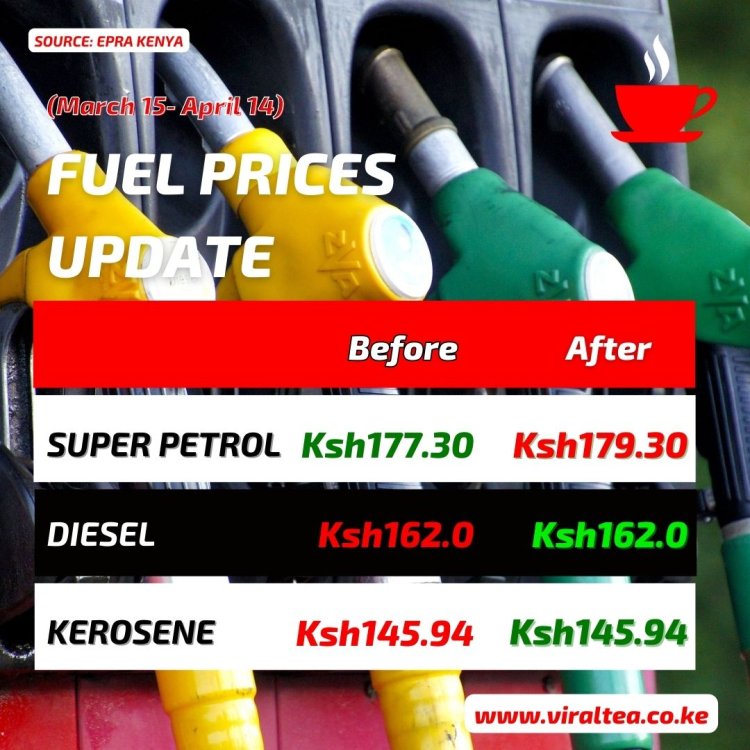EPRA Speaks On Kenya's New Fuel Deal Affecting Monthly Prices
Kiptoo however noted that the freight and premiums will change as the government will be doing freight and premium across three cargoes at the same time.

Energy and Petroleum Regulatory Authority (EPRA) Director General Daniel Kiptoo on Friday, April 14 dismissed the possibility of 160,000 metric tonnes of fuel received on Thursday, April 13 under the Government-Government agreement having an effect on the computation of monthly fuel prices.
During an interview with the Business Daily, Kiptoo noted that the new government deal will mainly be used to address the crisis concerning the dollar shortage in Kenya.
He explained that only the landing cost, paid in dollars, will be subjected to change and that the fuel pricing formula used by the regulator would not be affected in the deal that saw the first consignment of fuel arrive on Thursday and be received by Deputy President Rigathi Gachagua.

"This is because price build-up remains the same. The only change will be in the landed cost, which is the biggest cost and is paid in dollars. But now oil marketers will pay importers in Kenya shillings.
"However, instead of having different rates for freight and premium for eight cargoes as it happens in the Open Tendering System (OTS), we will have the same rates for three grades — super, diesel and jet," he stated.
Kiptoo however noted that the freight and premiums will change as the government will be doing freight and premium across three cargoes at the same time.
"What will change is the freight and premium because we will not be doing freight and premium for individual cargoes but it will be uniform across three cargoes because there is only one supplier," he added.
In terms of the government-to-government deal, Kiptoo revealed that it would be reviewed in December and if the economy stabilises or the dollar shortage is resolved, the government will have the option to revert to the open tendering system or extend the deal.
"We will be able to revert to the OTS if and when conditions allow us, remember, we are using petroleum to solve the dollar issue. What we did is that as per the Petroleum Act and regulations, we have just exercised the other option which is the flexibility to use OTS or a government-backed deal," he added.
Open Tender System (OTS) is defined in Section 2 of the Petroleum Act 2019 as the mode of procurement of petroleum products in Kenya whereby the lowest bidder on any given product is allowed to import on behalf of all the other oil marketing companies.
The government has OTS cargoes that marketers have ordered and so as the regulator, EPRA has to ensure that marketers do not abandon their obligations and must ensure that they do not abandon the OTS cargo that must be paid for in dollars.
"So if a marketer had ordered 100 million litres of fuel through the OTS, then that obligation must be settled, otherwise we will crack the whip on them," Kiptoo vowed.
In terms of the new tariff that took effect in April whereby EPRA reduced the fuel cost charge to about Ksh3 from Ksh8, Kiptoo explained that the regulator is getting to the tail end of historical costs, which is the 15 per cent government subsidy and had to hold fuel cost charge constant to sustain the subsidy, new power plants that came in since 2018 but were not included in the base tariff.
DP Gachagua while receiving the consignment reiterated that the government would not subsidise products in the country, terming it unsustainable and that it instead would subsidise the production of different products that will in turn reduce their cost.
“This is the way to bring down the cost of fuel. That strategy of fuel subsidy is not sustainable. We want to dismiss with contempt those who are calling us and telling us to reinstate subsidised consumption, it cannot work.
“The government will subsidise production because it is sustainable. This is the practical way of dealing with the high cost of fuel and other products in the country,” he noted.
EPRA is set to review its prices for the month between Saturday, April 15 and Sunday, May 14 on April 14, with the cost of Super Petrol currently retailing at Ksh179.3 per litre in Nairobi, Diesel and Kerosene at Ksh162 and Ksh145.95 per litre respectively at the pump

New fuel prices as announced by EPRA on March 14, 2023. /VIRALTEAKE

 admin
admin 




